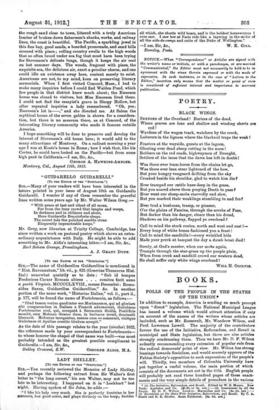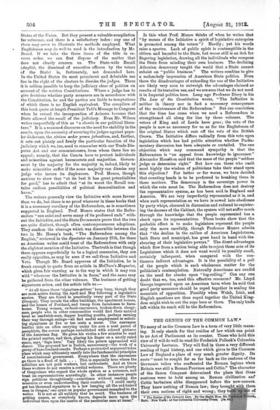BOOKS.
POLLS OF THE PEOPLE IN THE STATES OF THE UNION.*
IN addition to example, America is sending us much precept upon "direct" legislation. The National Municipal League
has issued a volume which would attract attention if only on account of the names of the writers whose articles are included, such as Mr. Roosevelt., Mr. Woodrow Wilson, and Prof. Lawrence Lowell. The majority of the contributors favour the use of the Initiative, Referendum, and Recall in municipal and State legislation, but there are also articles strongly condemning them. Then we have Mr. D. F. Wilcox ardently recommending every extension of popular rule from the radical democrats' point of view. Mr. Wilcox has strong leanings towards Socialism, and would scarcely approve of the Fabian Society's opposition to such expressions of the people's will. Thirdly, two members of Columbia University have put together a useful volume, the main portion of which consists of the documents set out in the title. English people will probably not read three hundred pages of these enact- ments and the very simple details of procedure in the various
• (1) The Initiative, Referendum, and Recall. Edited by W. B. Munro. New York: Appleton and Co. [$IM, or 68. net.]—(21 Government by AU the
People. By D. F. Wilcox. London Macmillan and Co. [63. net.1-- (3) Documents on the State-Wide Initiative, Referendum, and Recall. By C. A. Beard and B. E. Shultz. Same Publisher. gle. 6d. net.]
States of the Union. But they present a valuable compilation for reference, and there is a satisfactory index : any one of them may serve to illustrate the methods employed. What • Englishmen may do well to read is the introduction by Mr.
Beard. If we take the three items of the title in re- verse order, we can first dispose of the matter that does not closely concern us. The State-wide Recall (Anglice, the dismissal of executive officers by the voters of the State) is, fortunately, not demanded here. In the United States its most prominent and debatable use lies in the right of the electors to dismiss the judges. There it is seldom possible to keep the judiciary clear of politics on account of the written Constitutions. Where a judge has to give decisions whether party measures are in accordance with the Constitution, he and the parties are liable to temptations of which there is no English equivalent. The compilers of this book quote at length President Taft's Message to Congress when he vetoed the incorporation of Arizona because that State allowed the recall of the judiciary. Even Mr. Wilcox writes respectfully of this as "a classic in our political litera- ture." It is a reasoned discourse on the need for stability in the courts, upon the necessity of securing the judges against popu- lar disfavour, the cirium ardor prava jnbentiuns, and, further, it sets out plainly and firmly the particular function of the judiciary which we, too, need to remember with our Trade Dis- putes Act and our commissioners, from whom there lies no appeal ; namely, that the Courts have to protect individuals and minorities against bureaucrats and majorities. Govern- ment by the majority for the majority is, indeed, likely to make minorities suffer if the same majority can dismiss any judge who incurs its displeasure. Prof. Munro, though anxious to show that "at its best it has great potentialities for good," has to admit that " at its worst the Recall con- tains endless possibilities of political demoralization and harm."
The writers generally view the Initiative with more favour than we do, but there is no proof whatever in these books that it is a necessary corollary of the Referendum, as is sometimes suggested in England. Prof. Munro states that the Refer-
endum "can exist and serve many of its professed ends" with- out the Initiative, and the State Domments prove that the two
are quite distinct, though often contemporaneous adoptions. They confirm the cleavage which was discernible between the two in Mr. Honey's book, " The Referendum among the English," reviewed in the Spectator on January 27th, for there an American writer could treat of the Referendum with only the slightest mention of the Initiative. The truth is that though there appears superficially to be a logical connexion, they are really opposites, as may be seen if we call them Initiative and Veto. Though Mr. Beard approves of the Initiative, he is frank enough to quote from an article in McClure's Magazine,
which gives fair warning as to the way in which it may run wild " wherever the Initiative is in force," and the same may be gathered from the other volumes. The business of getting signatures arises, and the article tells us:— "At all times these `signature-getters' keep busy, though they are most active during the April and May following a legislative session. They are found in practically every part of the State (Oregon). They invade the office buildings, the apartment houses, and the homes of Portland, and tramp from farmhouse to farm- house. Young women, ex-book-canvassers, broken-down clergy- men, people who in other communities would find their natural level as sandwich-men, dapper hustling youths, perhaps earning their way through college—all find useful employment in solicit- ing signatures at five or ten cents a name. The canvasser bustles into an office carrying under his arm a neat parcel of pamphlets, the covers perhaps embellished with colored pictures of the American flag. He gives his victim a few minutes to read the printed matter, and then, placing his finger on a neatly ruled space, says, Sign here.' Very likely the person approached will demur. The proposed law is foolish, unnecessary—the work of a group of hare-brained cranks. Perhaps a protracted argument takes place which may ultimately ramify into the fundamental principles of constitutional government. Everywhere that the canvassers go there is a flood of talk. . . . This is especially true where the solicitors are not paid workers, but enthusiasts. And at times these workers do not receive a cordial welcome. There are plenty of Oregonians who regard the whole system as a nuisance, and treat its representatives accordingly. In other instances people sign petitions thoughtlessly—sometimes without reading the measures or even understanding their contents. 'I could easily get ten thousand signatures to a law hanging all the red-haired men in Oregon,' one cynic on popular government remarked to the writer. It is not at all unlikely that he could. The business of getting names, as everybody knows, depends more upon the individual than upon the merits of the particular case at issue." Is this what Prof. Munro thinks of when he writes that "by means of the Initiative a spirit of legislative enterprise is promoted among the voters " ? Hardly ; yet his words raise a spectre. Lack of public spirit is contemptible in the citizen and harmful to the State, but worse still is an itch for fingering legislation, drawing all the individuals who compose the State from minding their own business. The declining Athenian democracy taught the world that a State cannot subsist on "public business." The writers combine to give a melancholy impression of American State politics. Even there the disadvantages of extending the use of the Initiative are likely very soon to outweigh the advantages claimed as results of its tentative use, and we are sure that we do hot need it in Imperial politics here. Long ago Professor Dicey in his The Law of the Constitution wrote, " The Initiative is neither in theory nor in fact a necessary consequence of the maintenance of the Referendum." But our conviction that the time has come when we need a Referendum is strengthened all along the line by these volumes. The vetoes of King and of Lords have gone ; the veto of the people is now as necessary for us as for the Englishmen of the original States which cast off the veto of the British Crown. The Initiative differs radically from this veto upon legislation which has had public attention whether Parlia- mentary discussion has been adequate or curtailed. The one objection which may command sympathy is that the Referendum is "an appeal from knowledge to ignorance." Alexander Hamilton said that the mass of the people "seldom judge or determine right." But bow can those who exalt most highly the wisdom of politicians take their stand upon this objection ? For better or for worse, we have decided that counting heads is to be preferred to breaking them in these matters. The democracy is the sovereign power in which the veto must lie. The Referendum does not destroy the representative system, as has been said in England and America. We are very imperfectly represented as it is, and when such representation as we have is cowed into obedience by party whips, closured in discussion and reduced to register- ing the decrees of the Cabinet, the system will not suffer much through the knowledge that the people represented has a check upon its representatives. These books show that the probable effect is to make legislators represent the people only the more carefully, though Professor Munro admits that " the decline in the calibre of American Legislatures, both State and municipal, has gone hand in hand with the shearing of their legislative powers." The direct advantages which flow from a nation being able to reject those acts of its Legislature which it does not want would be possibly small, certainly infrequent, when compared with the con- tinuous indirect advantages. It is the possibility of a poll of the people which is such wholesome matter for the politician's contemplation. Naturally Americans are candid on the need for checks upon "log-rolling." Can any one doubt that we, too, need this effective resource ? Mr. Lloyd George improved upon an American term when he said that good party measures should be roped together in scaling the mountain of opposition. Possibly when Welsh, Irish, and English questions are thus roped together the United King- dom might wish to cut the rope here or there. The only knife left within its reach will be the Referendum.



































 Previous page
Previous page